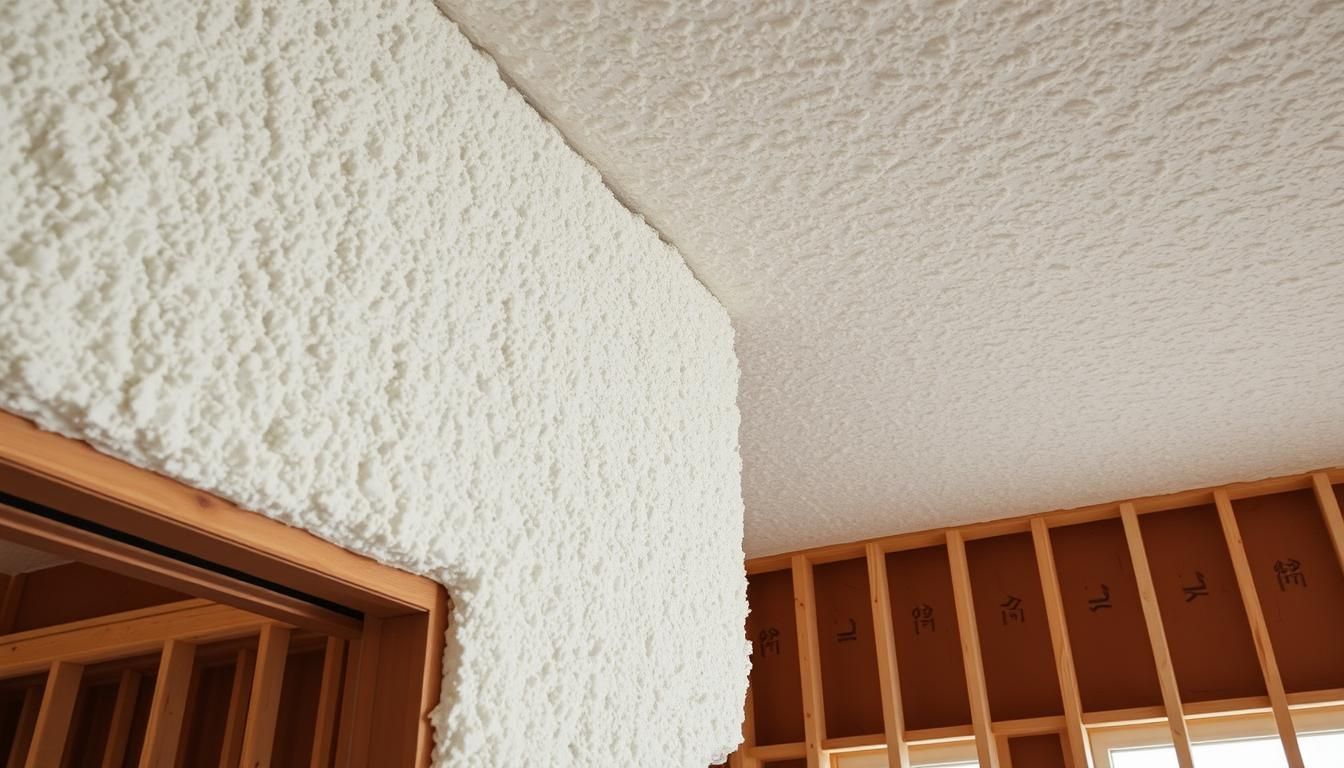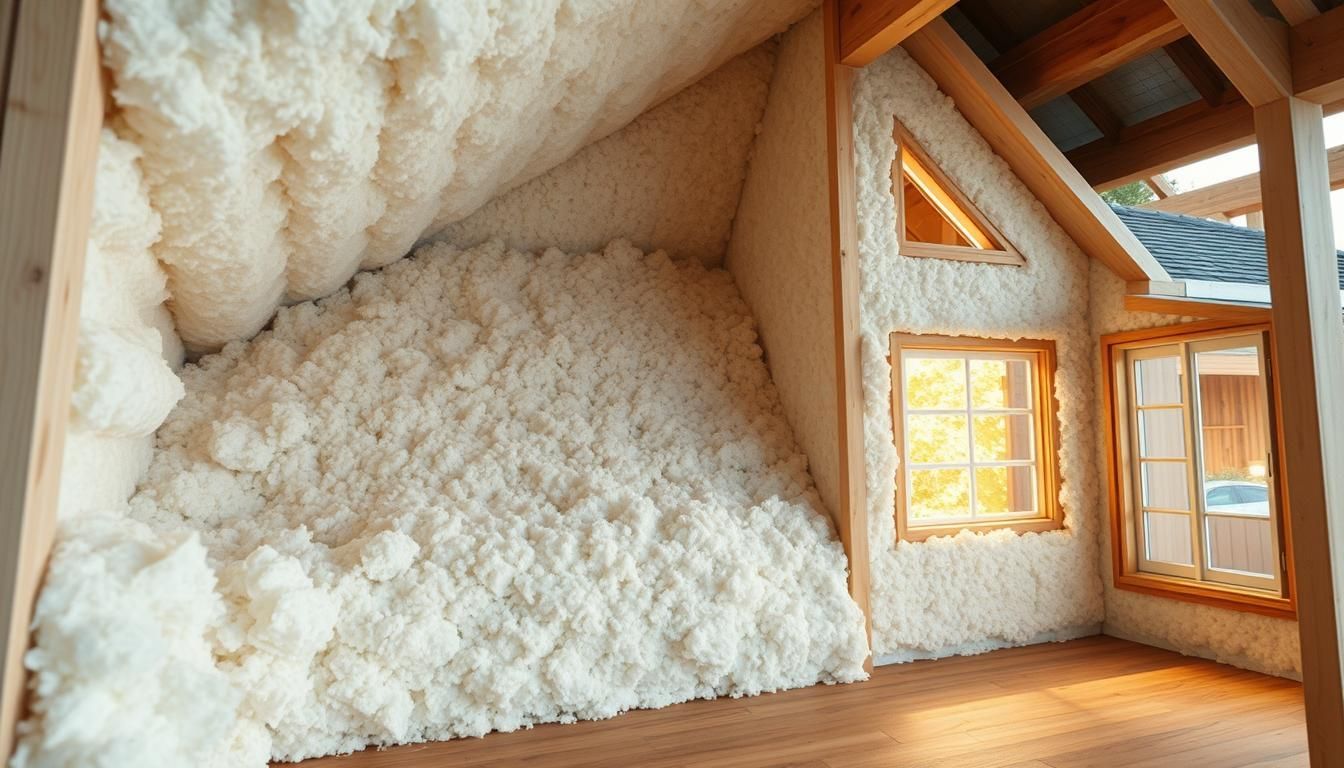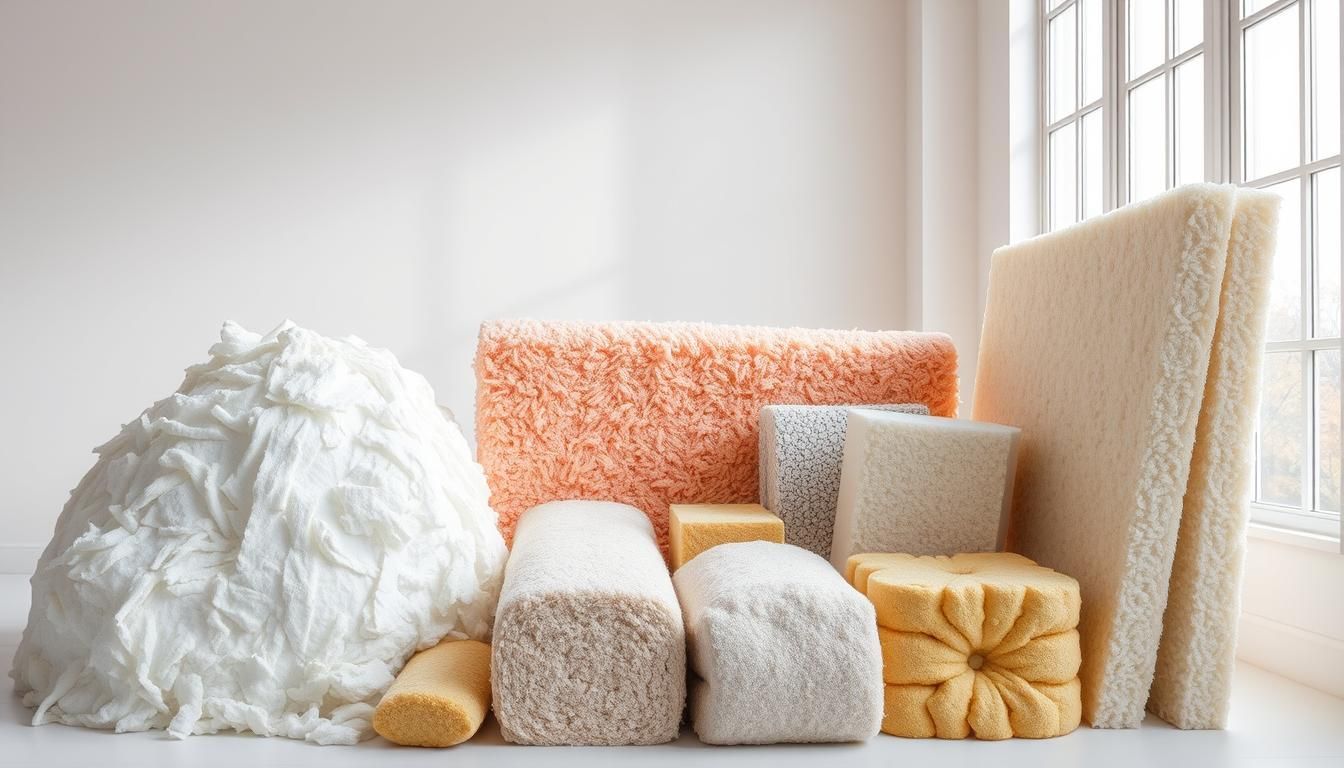Choosing the Right Insulation: A Guide for Homeowners & Property Owners
As a homeowner or property owner, picking the right insulation is key. It keeps your home comfy, saves energy, and cuts costs. Proper insulation also makes your property last longer and helps the planet.

Choosing effective insulation solutions like spray foam insulation services can save you money in the long run. It also boosts your property's value. Knowing your options, whether for residential or commercial spray foam insulation, is essential.
Key Takeaways
- Proper insulation reduces energy costs and enhances property durability.
- Effective insulation solutions contribute to a more sustainable environment.
- Understanding your insulation options is crucial for making an informed decision.
- Spray foam insulation services can offer significant long-term savings.
- Choosing the right insulation depends on your specific residential or commercial needs.
Understanding Home Insulation Basics
A well-insulated home is not just a comfort luxury, but a necessity. It helps reduce energy waste and save on utility bills. Home insulation creates a barrier between your home and the outside environment. This barrier reduces heat transfer and keeps your indoor climate consistent.

The Science Behind Insulation and R-Values
Insulation traps air in small spaces, reducing heat transfer. The R-Value measures insulation's effectiveness. The higher the R-Value, the better it is at keeping heat out.
Choosing the right insulation with the right R-Value is key for energy efficiency.
Why Proper Insulation Matters for Energy Efficiency
Proper insulation is crucial for energy efficiency in homes and businesses. It reduces heat loss in winter and heat gain in summer. This lowers the load on heating and cooling systems, saving energy and money.
Efficient insulation also helps reduce greenhouse gas emissions, making it eco-friendly.
Common Problem Areas in Residential and Commercial Properties
In homes and businesses, common insulation gaps are in attics, walls, floors, and crawl spaces. These areas are vital for preventing heat transfer and ensuring energy efficiency. Identifying and fixing these gaps is the first step to better insulation and less energy waste.
Types of Insulation Materials Available Today
Insulation is key for saving energy. Today, many materials are available to meet different needs. The right insulation can lower energy use, improve comfort, and increase a property's value.

Traditional Insulation Options
For decades, traditional insulation has been a top choice. Fiberglass batts and rolls are favorites. They're made from glass fibers and come in various thicknesses and R-values. Cellulose and mineral wool are also traditional picks. Cellulose comes from recycled paper and is fire-resistant. Mineral wool, from natural or synthetic fibers, is also fire-resistant. Yet, traditional insulation has its downsides. Fiberglass can get damaged by moisture and doesn't work well in tight spots. Cellulose and mineral wool are pricier and can settle over time, affecting their performance.
Modern Insulation Solutions
Modern insulation options are gaining fans for their better performance and flexibility. Spray foam insulation is a top choice. It expands to fill gaps, offering great energy efficiency and air sealing.
Rigid foam board insulation is another modern favorite. It has high R-values and works well in many places, like exterior sheathing and interior walls. Reflective and radiant barriers are also used to keep heat away in warm climates.
Eco-Friendly Insulation Alternatives
Eco-friendly insulation is becoming more popular. These materials use recycled or natural products, making them better for the environment. Examples include recycled denim, sheep's wool, and recycled plastic insulation.
These options not only help the planet but also offer benefits like natural moisture control and better air quality. However, they might be harder to find and more expensive. Some may need special installation.
Spray Foam Insulation Services: What You Need to Know
Spray foam insulation services are popular for making spaces more energy-efficient and comfortable. This section will explain spray foam insulation, helping you choose the best option for your property.
Open-Cell vs. Closed-Cell Spray Foam
Spray foam insulation has two main types: open-cell and closed-cell. Knowing the differences is key to picking the right insulation for your needs.
Density and Expansion Properties
Open-cell spray foam is less dense and expands to fill spaces well. It's good for areas where moisture isn't a big issue. Closed-cell spray foam, being denser, offers better insulation against heat and moisture.
R-Value Comparisons
The R-value shows how well insulation resists heat flow. Closed-cell spray foam generally has a higher R-value per inch. This makes it more effective in some situations.
Best Applications for Each Type
Use open-cell spray foam in interior walls and ceilings where moisture isn't a problem. Closed-cell spray foam is better for areas exposed to moisture, like basements and exterior walls.
Professional Installation Process Explained
Getting spray foam insulation installed right is crucial. A professional job ensures the insulation works well and lasts longer.
Site Preparation Requirements
Before starting, the area must be clean and free of debris. The surface should also be dry.
Application Techniques
Installers use special equipment to apply the foam. They control the amount and ensure even coverage.
Curing and Finishing Processes
After applying, the foam hardens. It may then be trimmed or finished as needed for the final stages of construction or renovation.
DIY vs. Professional Installation Considerations
DIY might seem cheaper, but professional installation is usually better. It's more complex and requires special equipment.
Professionals ensure the job is done right and safely. They avoid problems like improper curing and health risks from handling chemicals.
Benefits of Spray Foam Insulation for Property Owners
Spray foam insulation offers many benefits. It improves energy efficiency, seals air, and controls moisture. This makes it a great choice for those wanting to enhance their building's performance and comfort.
Superior Energy Efficiency and Cost Savings
Spray foam insulation is known for cutting down energy use. It seals the property tightly, keeping heated or cooled air inside. This lowers the need for heating and cooling, saving money on bills.
The U.S. Department of Energy says insulation can cut heating and cooling costs by up to 30%. Spray foam, with its high R-value, is especially good at saving money.
Air Sealing and Moisture Control Capabilities
Spray foam insulation is also great at air sealing and moisture control. It fills gaps and cracks, stopping air leaks and moisture. This helps keep the building safe from mold and mildew.
"Spray foam insulation is a critical component in modern building construction, offering unparalleled air sealing and moisture control. Its application can significantly enhance the durability and healthiness of a building's environment."
Longevity and Structural Benefits
Spray foam insulation offers both immediate and long-term benefits. It lasts for decades, keeping buildings insulated and protected from the environment.
It also makes buildings stronger and can even increase their value. Its ability to stick to different surfaces and provide a solid insulation layer is perfect for new and old buildings.
Residential Spray Foam Insulation Applications
Spray foam insulation is great for homes because it works well everywhere. It keeps your home warm and saves energy. You can use it in many parts of your house.
Attic and Roof Insulation Solutions
Heat can escape through attics and roofs. Spray foam insulation stops this heat loss. It keeps your home at a steady temperature.
It's especially good for attics with high ceilings. Spray foam fills in gaps and blocks heat flow.
Cathedral Ceilings and Vaulted Spaces
Cathedral ceilings and vaulted spaces need special insulation. Spray foam insulation works well here. It's applied directly to the ceiling.
This makes sure there are no gaps. It boosts energy efficiency and makes your home more comfortable.
Attic Conversion Considerations
Turning an attic into a living area needs good insulation. Spray foam insulation helps with warmth and moisture control. Think about ventilation and the type of foam used.
Wall Cavity and Basement Applications
Spray foam insulation is also good for walls and basements. It cuts down on air leaks and boosts energy efficiency. In basements, it stops moisture and keeps warm air in.
Crawl Space and Floor Insulation
Crawl spaces and floors often lack insulation. But, spray foam insulation can be used here too. It stops heat loss and moisture problems. This is key in cold or humid climates.
Commercial Spray Foam Insulation Solutions
In the commercial world, spray foam insulation is key for saving energy and lasting durability. Businesses want to cut down on energy use and make their buildings stronger. So, they need good insulation.
Warehouse and Industrial Building Applications
Spray foam is great for warehouses and industrial places. It keeps the temperature steady, saving on energy costs. It also stops moisture from getting in, which can harm goods and tools.
Key Benefits for Warehouses and Industrial Buildings:
- Enhanced energy efficiency
- Improved moisture control
- Increased durability of the building structure
Office Building and Retail Space Considerations
In offices and shops, spray foam helps save energy and makes the space more comfortable. It keeps the climate inside steady, making it better for work or shopping. It also helps block out noise, which is good in busy areas.
Efficient insulation solutions like spray foam can significantly impact the bottom line of commercial operations by reducing heating and cooling costs.
Integration with Commercial Roofing Services
Working spray foam insulation with roofing services is important for building owners. It means teaming up with commercial roof contractors to make sure everything works well together. This teamwork can make the roof last longer and cost less to maintain.
Spray Foam for Flat Roof Systems
Spray foam is especially good for flat roofs. It creates a solid, waterproof layer right on the roof deck.
Coordination with Commercial Roof Contractors
Getting spray foam insulation to work with roofing needs careful planning and doing. Building owners should team up with skilled commercial roof contractors. This ensures the insulation is set up right and fits with the roof.
Commercial Roofing Services and Insulation Integration
Integrating insulation with commercial roofing services is key in today's buildings. As buildings get older, keeping the roof well-insulated is crucial. It cuts down on energy costs and makes the roof last longer.
How Spray Foam Enhances Commercial Roof Performance
Spray foam insulation is a top choice for commercial roofs. It's great because it saves energy. It seals gaps and keeps the temperature steady, easing the load on HVAC systems.
Energy Efficiency Benefits for Large Structures
Big commercial buildings save a lot with spray foam insulation. The U.S. Department of Energy says it can cut energy costs by up to 30%. "Quality insulation cuts down on costs," says an energy expert.
Extending Roof Lifespan with Proper Insulation
Good insulation also makes roofs last longer. It lessens thermal stress and stops moisture buildup. This stops common roof problems, saving money in the long run.
Leak Prevention and Waterproofing
Spray foam insulation also stops leaks and keeps roofs dry. When applied right, it makes a solid barrier against water. This reduces the chance of leaks and damage.
"Spray foam insulation is a game-changer for commercial roofing. It not only improves energy efficiency but also provides a durable, long-lasting solution for roof integrity."
- Industry Expert
Working with Commercial Roof Contractors on Insulation Projects
For spray foam insulation with commercial roofing, you need skilled commercial roof contractors. They know how to install insulation right and make it work well.
Finding Qualified Commercial Contractors
To find good contractors, look for local companies with a strong track record. Check for certifications and read what past clients say.
Coordinating Roofing and Insulation Work
It's important to coordinate roofing and insulation work well. Contractors should talk with building owners to understand their needs and plan accordingly.
Maintenance Schedules for Insulated Commercial Roofs
Lastly, having a regular maintenance plan is key for an insulated roof. Regular checks and quick fixes prevent big problems later.
Spray Foam Insulation Cost Analysis
Knowing the cost of spray foam insulation is key for homeowners and property owners. It helps improve energy efficiency. The upfront cost is high, but the long-term savings are worth it.
Factors Affecting Spray Foam Insulation Pricing
Several things affect the cost of spray foam insulation. These include the area size, installation complexity, and regional prices.
Square Footage Considerations
The bigger the area, the more material needed, which raises the cost. Contractors charge by the square foot. Knowing the total area is key for cost estimates.
Accessibility and Complexity Factors
Hard-to-reach or complex areas increase labor costs. This includes spaces with tricky shapes or hard-to-access spots.
Regional Price Variations
Prices for spray foam insulation vary by region. This is due to labor costs, local rules, and demand. Getting quotes from local contractors is crucial for accurate estimates.
Comparing Costs: Spray Foam vs. Traditional Insulation
Spray foam insulation costs more upfront than traditional methods. But, its long-term benefits make it worth it. It seals air better and controls moisture, reducing future repairs and energy costs.
"Spray foam insulation can reduce energy consumption by up to 50% compared to traditional insulation methods."
Return on Investment and Long-Term Savings
The ROI for spray foam insulation is high. This is mainly due to lower energy bills and tax incentives.
Energy Bill Reduction Calculations
Spray foam insulation makes buildings tighter, saving on heating and cooling. Savings vary by climate, insulation level, and HVAC efficiency.
Tax Incentives and Rebates
Many governments offer incentives for energy-efficient upgrades, like spray foam insulation. These incentives can lower the initial cost, boosting ROI.
Investing in spray foam insulation boosts a property's comfort and energy efficiency. It also increases its value over time. Understanding cost factors and long-term savings helps property owners make smart insulation choices.
Step-by-Step Guide to Choosing the Right Insulation
There are many insulation options out there. To find the best one for your place, you need a clear plan. Choosing the right insulation is key to saving energy and keeping your space comfy.
Step 1: Assess Your Property's Specific Needs
Start by figuring out what your property needs. Look for gaps, leaks, or thin insulation in walls, ceilings, or floors.
Identifying Problem Areas: Do a detailed check for heat leaks or gains. Check windows, doors, and any holes in the building.
Determining Insulation Goals: Know what you want from your insulation upgrade. Do you want to cut energy costs, feel more comfortable, or boost your property's value? Knowing your goals helps pick the right insulation.
Step 2: Consider Climate and Local Building Codes
Climate and local building rules are key in picking insulation. Different areas need different insulation levels to stay energy-efficient and follow rules.
Climate Considerations: In cold places, you need insulation with high R-values to keep warm. In hot places, focus on keeping cool.
"The right insulation can make a big difference in energy use and comfort, no matter the climate."
Step 3: Evaluate Different Insulation Options
There are many insulation materials, each with its own pros and cons. Choose based on your property's needs, climate, and budget.
Traditional vs. Modern Insulation: Fiberglass batts are common, but spray foam insulation might be better in some cases.
Step 4: Balance Budget with Performance Requirements
It's important to match your budget with insulation needs. While spray foam might save money in the long run, it might be too pricey for some.
Cost-Benefit Analysis: Do a cost-benefit study to see which insulation is worth it. Think about the initial cost and long-term energy savings.
Finding Quality Spray Foam Insulation Near Me
Looking for top-notch spray foam insulation starts with finding reliable local contractors. When searching for "spray foam insulation near me," do your homework. This ensures you hire a pro who delivers excellent results.
Researching and Vetting Local Contractors
To find the best local contractors for your needs, start with referrals from friends and family. Online reviews on Yelp or Google Reviews also offer insights into a contractor's reputation and quality of work.
Online Reviews and Testimonials
When checking out contractors, focus on online reviews and testimonials. Look for common themes in feedback, like consistent praise or complaints. This helps you understand their reliability and work ethic.
Certification and Insurance Verification
Make sure your contractor is certified and insured. Check for certifications from well-known organizations. Also, confirm they have the right insurance to protect you and their workers.
Questions to Ask Before Hiring an Insulation Professional
Before you hire, make a list of questions. Ask about their experience with spray foam insulation, their installation process, and materials used. This ensures they're the right fit for your project.
Red Flags to Watch For When Selecting a Service Provider
Watch out for contractors with red flags like very low prices or poor communication. These signs might mean they're not professional or could be scams. Always trust your gut and get a second opinion if something seems wrong.
Preparing Your Property for Insulation Installation
Getting your property ready for insulation is key. It makes the installation smooth and efficient.
Pre-Installation Checklist for Homeowners
Homeowners need to do a few things before the team starts. First, clearing access areas is crucial. This lets the team get to all the spaces they need.
Clearing access areas means removing furniture or stored items. This avoids delays and problems during the installation.
It's important to address any existing moisture issues before starting. This might mean fixing leaks, improving ventilation, or using a dehumidifier.
Electrical and HVAC Considerations
Homeowners should think about electrical and HVAC system modifications needed before insulation. This includes moving electrical outlets or HVAC parts to avoid insulation blocking them.
Safety Considerations and Temporary Living Arrangements
When getting ready for insulation, safety and living arrangements are key. You might need to move pets or family members. Or make plans for where to stay while the work is done.
By following this checklist and thinking about safety and living arrangements, homeowners can have a hassle-free insulation installation.
Maintenance and Longevity of Insulation Systems
Keeping your insulation in good shape is key to its long life. Regular checks help your insulation work better and last longer. This is especially true for spray foam, which is known for its durability and energy-saving benefits.
The long-term performance of spray foam insulation is a big plus. If installed right, it can last for decades. But, extreme temperatures, moisture, and damage can wear it down. Regular checks can spot problems early.
Long-Term Performance of Spray Foam
Spray foam insulation is known for keeping its insulating power over time. It doesn't lose its effectiveness like some other materials do. Its closed-cell structure also helps keep moisture out and air sealed, making it last longer.
To keep spray foam in top shape, avoid damaging it during upkeep or renovations. Fix any damage quickly to stop moisture or performance issues.
When to Consider Insulation Replacement or Upgrades
Even though it's durable, sometimes you might need to replace or upgrade your insulation. Look out for damage, lower energy efficiency, or changes in your building's use. For example, adding new rooms or changing your building's layout might mean you need better insulation.
Also, if you keep getting moisture problems or see big jumps in your energy bills, it's time to check your insulation. A pro can help figure out if you need a fix, an upgrade, or a full replacement.
Knowing how to care for and when to replace your insulation helps keep your place energy-efficient and cozy for years. It's all about making smart choices for your property's upkeep.
Conclusion: Making an Informed Insulation Decision
Choosing the right insulation is key for homeowners and property owners. It affects energy efficiency, cost savings, and property performance. We've looked at various insulation options, like spray foam insulation services, and their benefits.
Knowing the basics of home insulation and the different materials helps you make a smart choice. Consider the climate, local building codes, and your budget. This will help you pick the best insulation for your needs. Spray foam insulation services are known for their energy efficiency, air sealing, and moisture control. They are a top choice for many. By comparing the costs and benefits of different insulation, you can improve your property's performance and save money in the long run. In the end, a well-informed decision can save you money, reduce energy use, and increase your property's value.
FAQ
What is spray foam insulation, and how does it work?
Spray foam insulation is a liquid that expands to fill gaps. It acts as a barrier against heat, air, and moisture.
What are the benefits of using spray foam insulation in my property?
Spray foam insulation boosts energy efficiency and seals air leaks. It controls moisture and lasts long. It also cuts down energy bills and improves indoor air quality.
How do I choose between open-cell and closed-cell spray foam insulation?
Choose based on application, climate, and R-value needs. Open-cell is less dense and flexible. Closed-cell is denser and has a higher R-value.
Can I install spray foam insulation myself, or do I need a professional?
DIY kits are available, but professional installation is recommended. A pro can tailor a solution for your property.
How much does spray foam insulation cost, and what factors affect the price?
Cost varies by area size, foam type, and installation complexity. Accessibility, regional prices, and installer qualifications also play a role.
How do I find a qualified contractor to install spray foam insulation?
Look for local companies with good reviews and certifications. Ask about their experience and installation process. Watch out for low prices or lack of transparency.
What are the advantages of integrating spray foam insulation with commercial roofing services?
Combining insulation with roofing boosts energy efficiency and roof lifespan. It prevents leaks. Ensure seamless installation with commercial roof contractors.
How can I prepare my property for spray foam insulation installation?
Clear access areas and address moisture issues. Consider electrical and HVAC systems. Temporary living arrangements may be needed during installation.
What kind of maintenance is required for spray foam insulation?
It's low-maintenance but needs periodic checks for damage. Regular inspections ensure its long-term performance.
We Offer All the Services You Need in One Place! We Will Save You Time and Money!
Call Us at (425) 521-7916 Now to Get a Free Estimate or a Free Consultation for Any of Our Services!



